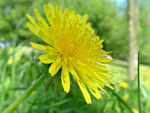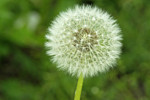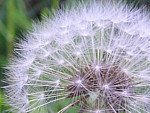You can kill dandelions and prevent them from taking over your lawn using either natural organic or chemical controls. Chemical controls are efficient and effective. On the other hand, natural weed control is labor intensive but will always be more eco-friendly.
Dandelions will invade thin, stressed turfgrass stands so the best way to prevent dandelions is to maintain a dense and healthy lawn that will make it hard for weeds to grow — a thick, vigorous lawn will keep many weeds out.
What we cover
ToggleNew Dandelions Can Sprout From the Taproot



The Challenge of killing dandelions and preventing their return:
Dandelions are simple perennials, they have a long taproot that allows them to survive the winter and regrow in the spring. A tiny piece of the taproot is capable of forming a new plant.
New plants spread and sprout from seed. The bright yellow flowers form white puffballs full of seeds that are dispersed by the wind. Every plant is capable of producing hundreds of seeds that will multiply around your yard and neighborhood, winds will carry and spread them over several miles. These seeds will germinate throughout the growing season.
Natural Weed Control
Dandelions will flower in the spring and again in the fall. The best time to attack them is right after they flower. Flowering and producing seeds takes a lot of energy, and when they have finished blooming, they are weakened by low food reserves in their taproots. This is the best time to physically remove by hand weeding or digging.
When pulling or digging, ensure the soil is moist and remove as much taproot as possible. Weeding tools like the Weed Twister, Weed Hound or a large flat-head screwdriver are helpful. You might have to dig a dandelion several times before it quits re-sprouting. Keep digging the new plants as they return and before they have time to form another large taproot.
Horticultural vinegar (20% acetic acid) can spot spray dandelions.
Kitchen-grade vinegar is not an effective herbicide, its acetic acid concentration is only 5%. The acetic acid concentration needs at least 20% to effectively control the natural organic weed.
Horticultural vinegar will only kill dandelion foliage – not the taproot – new plants will return from the taproot. Vinegar is also non-selective, take care to spray only weed foliage because it will kill any foliage that you spray – including your grass!
Citric Acid – Another non-selective organic option is herbicides that contain citric acid as the active ingredient (Burnout II is an example). These work the same as vinegar, they will kill weeds and grass so take care to apply only to weed foliage.
Sunday’s Dandelion Doom is an iron-based weed killer that is safe for lawns.
Corn Gluten Meal can sometimes be used as a natural weed and feed. It has been observed to work as a pre-emergent herbicide – it prevents seedlings from developing a root system – and it will not kill mature dandelions. Just be aware that CGM can be difficult to use as an herbicide – timing and environmental conditions must be perfect for it to work. It is 10% nitrogen by weight – making it a good natural organic fertilizer.
The best weed control is a thick, healthy lawn
Have you heard about the Sunday Smart Lawn Plan? It’s simple, do-it-yourself natural lawn care that’s customized to your soil, climate, and lawn. Delivered to you right when you need it.
Sunday’s plant and soil nutrient products are made from food waste, seaweed, and molasses. The natural additives stimulate plant growth and activate soil life. Dandelion Doom is a lawn weed killer derived from iron.
This is Super Environmentally Friendly lawn care!

Using Chemicals To Kill Dandelions
A weed is a plant that has mastered every survival skill except for learning how to grow in rows. – Doug Larson
Selective, post-emergence herbicides (referred to as broadleaf weed control) are the most effective dandelion killers that are safe for lawns. 2,4-D is an example of a selective and systemic post-emergent herbicide.
Late spring and fall is the best time to use broadleaf herbicides to kill dandelions.
Common brands available to homeowners and can be purchased at garden centers and home improvement stores include:
- SpeedZone Lawn Weed Killer
- Spectracide Weed Stop for Lawns
- Trimec Lawn Weed Killer
- Ortho Weed-b-Gon Weed Killer for Lawns
The herbicides listed above will kill weeds and not grass.
Glyphosate — Roundup is the most common brand — is a very effective weed killer that you can use in landscape beds, sidewalks and driveways. It is non-selective, so it will kill weeds and grass. Not recommended to kill dandelions in lawn areas.
Glyphosate is a broad-spectrum (non-selective) herbicide. Just like the organic herbicides mentioned above, only spray targets weeds.
Roundup is more effective than natural products because it will kill the whole plant — roots and shoots.
Crabgrass preventers (Pre-emergent herbicides) applied in the spring before weed seeds germinate will also help reduce the number of dandelion weed seedlings germinating and growing in lawns.
More Weed Control Information
How To Kill Weeds | Weed Killer for Lawns | Herbicides
How to Kill Weeds: Eliminate lawn weeds without killing grass and prevent their return. Helpful DIY lawn care tips and advice. Mowing, watering, fertilizing, pest control and more.
Lawn Weed Control | Herbicides | Weed Killer
Lawn weed control: herbicides are a group of pesticides designed to kill weeds. There are several types and selection depends upon weed species, timing, application method, and chemistry.
